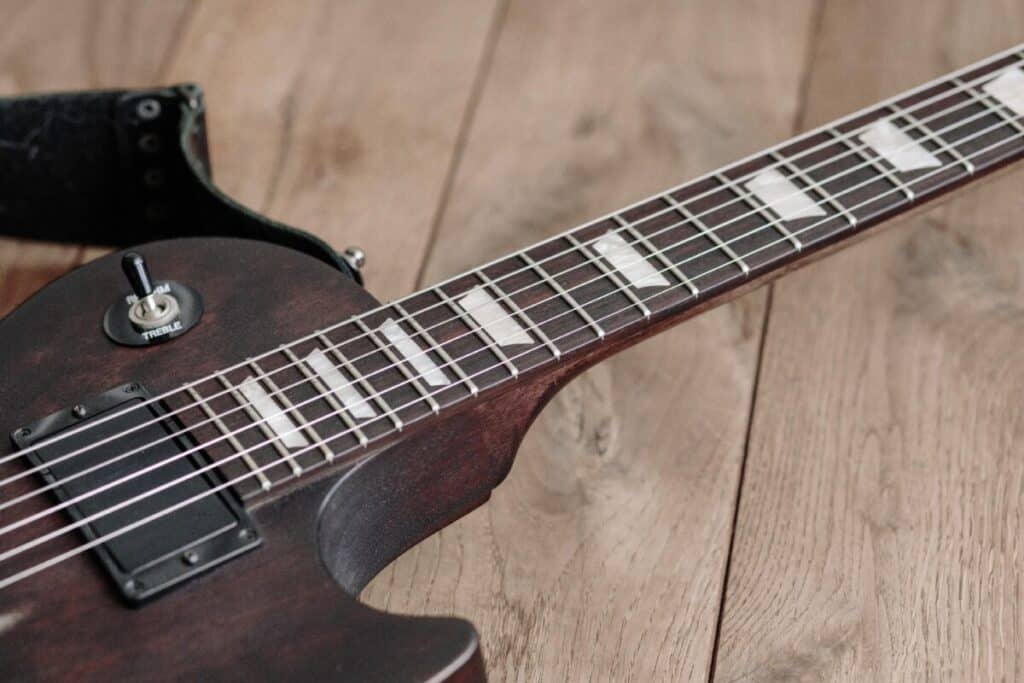This post contains affiliate links. We earn commissions if you purchase products from retailers after clicking on a link from our site. As an Amazon Associate, we earn from qualifying purchases.
Too much guitar practice isn’t usually the problem for most guitarists–oftentimes it’s finding enough time. If, however, you are someone who can put in the time, you might want to think twice about practicing all day for days on end.

By the way, looking for recording equipment and musical instruments? Check out Sweetwater.com for microphones, monitors, audio interface or any other recording gear that you could ever need. (Affiliate Link)
By the way, looking for a guitar? Check out GuitarCenter.com for acoustic, electric, or classical guitars as well as all the guitar gear you could ever need. (Affiliate Link)
Practicing guitar while fatigued, both physically and mentally, can lead to bad habits negating some of the prowess gained by practice. Over-practice can also lead to physical pain, and burnout.
So how do you find that balance of practicing too much vs. practicing too little? Is it possible that an hour a day of practice is not enough for one person and is too much for another? Let’s find out together.
Reasons Why Practicing Too Much Can Be a Bad Thing
It’s our natural tendency to assume that more is always better. Another thing we tend to think crosses over from sports and weightlifting applies to music as well: pain is gain.
Neither of these are exactly true for practicing your instrument. I say exactly true because difficult practice is much better than easy practice, but it’s all about what is difficult.
Let’s talk about reasons why over-practicing the guitar can be bad thing and what you can do about it.
Reason #1: Guitar Is One Of The Most Dangerous Instruments
You might think I’m pulling your leg, but I’m absolutely not. It turns out that guitar, ergonomically, is one of the most dangerous instruments out there to play.
Guitar, along with Piano and the Harp had the highest injury rate according to this study (source).
This makes sense if you think about it: the guitar is one of the more physically challenging instruments for several parts of the body.
- The Neck: With the guitar it’s easy to get into the habit (especially if you are learning the guitar) to look at the frets or where you are strumming. This peering-over posture can lead to neck problems. Additionally, playing with a shoulder strap can lead to some shoulder and neck strain.
- The Back: Perhaps one of the most affected regions of the body while playing the guitar is the back. Again, hunching over the guitar is a difficult habit to overcome that plagues many new students of the guitar–and even advanced players. Crossing your legs, or even having your hips at an uneven angle such as if you use a guitar footstool (read more about these at my post here if you want to know if they are helpful or not) are all contributors to potential back pain.
- The Wrists: Both wrists are highly engaged while playing the guitar. The strumming hand is actively moving and if you use a plectrum (pick) is constantly in a grip which can be difficult to hold for long periods of time, while the left hand has to be able to apply pressure for difficult barre chords while straight (or you’ll have a lot of wrist pain)
- The Fingers: Guitarists have to use a fair amount of pressure to hold the strings (with the left hand) and will have a combination of straight and curled fingers making the guitar one of the more demanding instruments for your fingers. Arthritis in the fingers is a terrible thing to face as a guitarists.
Over-practicing can hurt your body. But it doesn’t have to be this way. Studies have shown that students greatly benefit from learning how to align their bodies in ways to prevent injury (source).
So, the secret to staying safe while playing the guitar and being able to practice for long periods of time is to have good posture. However, that leads us to our next reason why over-practice can be a bad thing that is very much related to reason #1.
Reason #2 Difficulty In Maintaining Good Posture
So, if you have good posture while playing the guitar, you’re good right? Well, good posture usually means using your core and other muscles to maintain good alignment to ensure that any strain is happening on muscle instead of your joints, because muscles can strengthen. Muscles get tired, though.
If you’re practicing so long that your good posture is slowly disappearing, this is a great signpost telling you that you have done as much practice as your body can handle, today.
Like many musicians, you also use extremely fine motor skills which utilize micro-muscles. If you work to the point of exhaustion, you might find that your practice the next day won’t go as well because your muscles are so fatigued. Try to stop practicing well before exhaustion so you don’t burn your body out.
Reason #3 New Guitarists Are At the Highest Risk
If you are wanting to learn the guitar fast–you may be tempted to start a very difficult practice regiment with hours of learning. If you are brand new to the guitar, it will be very easy to over-practice.
In this study, students showed that they were most vulnerable to some pitfalls such as bad posture and perhaps even worse powering through pain or other issues instead of learning when to take a break or try something different.
When you first pick up the guitar, it’s so important to be patient with yourself and start with 10 minute practice sessions. Your muscles are going to be doing something they have never done before so it’s important to slowly ramp up so you can have success without frustration.
Reason #4 Mind-Numbing Practice Is Barely Practice
I unfortunately know too much about this subject. I’ve had my guitar on my wall for years, and although I’ve gone through times in my life where I play more than others, my practice approach was never very focused. I’ve always struggled with some things and I’d never taken the time to get better.
Recently, though, I tried an experiment where I did focused practice of the guitar to see if I could really improve if I put in some hours practicing and actually try constantly to practice things that were challenging.
I was blown away how only 30 days of practice had made me come so much farther.
I don’t know if I make a big enough deal in this video–I’ve been playing so casually for years without any real progress.
Practicing without purpose brings very little progress.
If you are able to do 30 minutes of focused practice and then an hour of practicing songs that you enjoy playing or just messing around, then you may not be getting the results that you want. The hour of messing around on the guitar is definitely the fun part and if it’s fun and you have the time, then it’s time well spent.
Just know that if you have a goal to practice for an hour a day and you tap out of the hard stuff at 30 minutes, then you may have a practice goal that is a bit too aggressive for where you are at.
Reason #5 Mental Exhaustion
The best practice is if you are highly active mentally. Some mechanical practice is good, but most of the progress happens when you’re thinking hard.
The problem is, our brain often acts like a muscle in that it only has so much to give. The brain, also like a muscle, can learn to stretch itself further and further, but there are limits.
If you find yourself getting on autopilot, or rather, if you find yourself doing repetitive exercises that are joyless or your mind is able to wander or you are able to listen to other conversations or watch TV/YouTube, then your mind has left the practice, and it’s time to take a break.
How Much Do Professional Guitarists Practice?
This is dangerous territory, because everybody’s learning style and life journey is so different that it’s really difficult to compare. Furthermore, while someone may practice for 8 hours a day, it may not be the most effective practice.
Don’t be discouraged and feel you have to match a particular guitar player since you may be able to reach your goals just fine without half of the same practice time.
The most dangerous people to compare yourself to are the legends:
Steve Vai: 10 Hours a Day
Steve Vai has a famous guitar workout that he reportedly does every day– and it’s 10 hours long. Guitar World compiled the workout and it’s available on Amazon here.
John Petrucci
John Petrucci says when he “caught the bug” he started practicing for 6 hours a day. He also has a very regimented practice method.
Other Professionals
From my research, this number varies a lot from what kind of gigs a professional guitarists will play. Some practice 3 hours a day, others an hour a day outside of band practice.
Most seem to recommend not shooting for a number of hours but for what seems right. If you are tired and don’t want to play after an hour of practice, than that’s good enough for the day, but as you get better and discover a deeper love for the instrument, the time will take care of itself.
